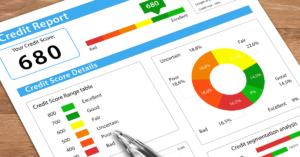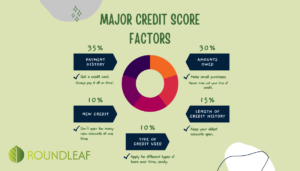10 Financial Tips for Young Adults

Personal finances can sound so boring to college students or young adults in their early 20s to early 30s. There are so many more exciting things to think about than your finances when you are young.
According to Experian, the average young adult aged between 25 and 34 holds an average debt amount of $78,396. If you don’t start thinking about your finances now you may end up in a hole of credit card debt.
Here are 10 personal finance tips to help you build your financial independence and stay out of debt!
1. Learn self-control
One of the biggest and most important tips for young adults is to learn self-control. Going out every night or every weekend sounds like a lot of fun. Yet, it also sounds like a lot of money. Make sure you learn how to say no.
An example I think most of us can relate to is buying an expensive car. Most of the time people end up overbuying when it comes to getting a new car. You go to the dealership and see all the fancy additions that the new cars have. You end up buying the car because right now the $400 monthly payment is in your budget.

What people don’t realize is that the $50,000 car depreciates once you drive it off the lot. A car is not an asset that appreciates over time. It actually is the opposite. You will never be able to sell that car for more than what you bought it for. You will also be paying more than $50,000 over the 7-year period due to interest.
Even though you can afford the monthly payments, is it worth it in the long run? Self-control is a habit that not very many people have. It is a habit that can lead to good money management. It will help you say no in the future when and if you have to.
2. Keep track of your finances
Another important finance tip to tackle as a young adult is to keep track of your finances. When you are young and making money you may spend and not keep track of where or how you are spending your money. This can help you in the long run to build good money management habits.

The key to keeping track of your finances is to keep it simple. This does not have to be a challenge. There are many ways to keep track of your money. From a piece of paper and a pen to using your phone. There are also many apps that can help you easily keep track of your money. The easier you make it the more you will do it!
Keeping track of your finances now will also help you begin to save now. We all have financial or even life goals that we want to achieve. Keeping track of your finances will help you save the amount of money you need to achieve your goals!
3. Start an emergency fund
Tip number 3 is to start an emergency fund. This is important for many reasons. But the most recent example is the covid 19 global pandemic. Many people, including someone you might know, either lost their job or lost some sort of income.

Now hopefully they had an emergency fund to help them get by until they figured out their next step.
However, those who did not have an emergency fund might have struggled and wished they had started an emergency fund a while ago. We must always think and plan for our future because we never know what is going to happen.
Now that is the worst-case scenario. On the other hand, it is also a good idea to have an emergency fund for everyday emergencies. A few examples are things like,
- car breaking down
- car break-ins
- getting sick and not having any more sick days at work
- wanting to take a vacation and not having any paid time off at work.
There are so many reasons why it is a good idea to have an emergency fund.
4. Start saving for retirement
Now I know you must be thinking, “I’m only 25, why would I start to save for retirement now?”. Now hear me out, when I was your age I thought the same thing. But, I am now 40 years old and have no idea what I’m doing about retirement.
Thinking and saving for retirement now will help you be less stressed about it down the road. With how things are in today’s society, there is no way you can rely on social security.

Start to plan out your retirement plans and goals, even though they may change, at least you have somewhere to start.
If you have no clue about retirement or where to begin when it comes to saving, speak to a financial advisor. Most of the time the consultations are free, so you can ask all the questions you want to!
5. Know and understand everything about your credit card
Now, this is where you are going to want to pay attention if you haven’t already been. Most college students and young adults are so eager to open a credit card. I get it, college can be hard when it comes to finances and supporting yourself.

However, there are things you should know and understand about credit cards before jumping into one.
- It is not free money, you have to pay it back.
- receiving a credit card in the mail does not mean you have already been accepted.
- Pay attention to any monthly fees that come along with owning a credit card.
- Know what your interest rate is for that credit card, they are all different.
- Understand the reason why you are opening a credit card (it is not just because your friend has one)
- Don’t get sucked into thinking it’s okay to only make the minimum payments ( you want to always pay the bill in full).

Why young adults should get a credit card
There are many reasons why getting a credit card is a good idea. After you have researched all the credit cards and their pros and cons, it is time to understand why you are getting one. This is not one of those scenarios where if your friend got a credit card that means you should. Make sure to have good reasons to support your decision. A few examples,
- To start to build credit
- To have in case of emergencies (Nowadays most places, typically when you travel, don’t take debit cards)
- To help you prepare for big life purchases such as a car or a house
Applying for a credit card is a big adult milestone. Credit cards can have many benefits for you and your future. They can also ruin your financial future if you do not know how to properly use one.
6. Learn how to budget your money
Learning how to budget your money is helpful no matter what stage in life you are in. Now a young adult who just graduated college and is looking for/already has an entry-level job can benefit from learning how to budget.
Nobody ever tells you how difficult your late 20’s – the early ’30s are. Don’t worry, learning how to budget can make all these life events seem possible! There are many different ways to budget, but the 50/30/20 budgeting rule is one of the most common and easy ways for people to learn how to budget.

50/30/20 budgeting rule
The 50/30/20 budgeting rule is a very common and easy way to budget your money. Think of it this way
- 50% of your monthly income goes to your necessary bills (rent, mortgage, groceries, basic utilities, car payments, etc.)
- 30% of your monthly income goes to your wants (Pedicures, shopping, eating out at restaurants, going on vacation, going to the movies, going to clubs, etc.)
- 20% of your monthly income goes to your savings (regular savings, emergency fund, retirement savings, etc.)
You may be thinking, is it right for 30% of your monthly income to go to your wants and only 20% of your monthly income to go to savings? While everyone’s situation is different and these percentages can be adjusted, it is important to have a little fun after working so hard.
To get a step-by-step budgeting plan, check out our article “4 Steps to Writing a Personal Finance Budget.”
7. Pay off your debt all at once

As we mentioned before, most young adults have more than $50,000 in debt. That is quite a lot of money to owe at such a young age. There are a few solutions that will help you pay off your debt all at once.
- Don’t just keep making minimum payments. Oftentimes it sounds easier to pay off your debt by only making minimum payments. However, you will be paying more in the long run due to interest payments.
- Consider consolidating your debt. Most of the time the $50,000 in debt is not from one type of debt. It may help to consolidate your debt to get a better interest rate and just have one payment instead of multiple payments.
- Consider debt relief options such as debt settlement. Depending on the type of debt you have, you may be eligible for debt settlement. Debt settlement will help you lower the total amount you owe to allow you to pay it off all at once.
Paying off your debt is an important part of achieving your financial goals. It can be a hard and long process to pay off all your debt but it is also worth it in the long run.
8. Start learning about investments
Investments can be a tricky thing to learn and understand. Most people just ignore the thought because it can take up too much time and effort. However, the biggest problem with ignoring financial investments is that you aren’t making your money work for you.
I am sure you have heard the saying “Make your money work for you or you will always work for your money”. Well, the saying is true. Investments can help you grow your finances and sometimes even double or triple the amount of money you are making.

There are several different ways to invest your money,
- Stocks
- Bonds
- Mutual Funds
- Property Investments
And these are just some of the most common. There are so many different types of investments. If you are interested in the thought of investing, it may be time to talk to a financial advisor.
9. Learn how to read your credit report
Tip number 9, learn how to read your credit report. While this one is not something you will do regularly, it is something you should know how to do. Your credit report will tell you everything you need to know about your credit score and how likely you are to get a loan accepted. It is also a good idea to learn how to read your credit report in case of credit card theft or fraud.

Your credit report is a summary of your past credit accounts. It tells future lenders how responsible you are and if they should give you a loan. It tells your lenders what your credit score is, if you have any debt in collections and if they should trust you.
There are 5 components that make up your credit score. These five components help make up your credit score and will show future lenders why your credit score is either good or bad.
These 5 components are:
- Payment history
- Amounts owed
- Length of credit history
- Types of credit used
- New credit

It is always important to understand your credit score and credit report, especially before you apply for any type of loan.
10. Don’t wait to seek financial help!

One of the most important financial tips for young adults is don’t wait to seek financial help. A lot of people tend to ignore their financial debt and situation because it is easier. The sooner you get the answers and help you need to clear your debt, the sooner you can reach your financial dreams.
Speak to our certified professionals to learn more about your financial future!

